Inspections
Twenty individual programmes were inspected in 2022-23 across 15 providers; three of these were related to new programmes and the remaining were risk based, including two programmes that had urgent inspections following concerns raised in the 2022 monitoring. All inspections took place in person.
Below is a breakdown of the number of inspections per discipline:
| Dentistry (BDS) | Dental technology (DT) | Clinical dental technology (CDT) | Dental nursing (DN) | Orthodontic therapy (OT) | Hygiene/hygiene therapy (H&HT) | |
| Inspections | 4 | 5 | 6 | 5 |
We plan to return for exam inspections for six out of the 20 programmes in August and September 2023.
All reports are published on the Latest Inspections page here.
Performance against individual standards and requirements
The inspection activity that was undertaken in 2022-23 has been analysed to identify common strengths and issues. Of the 20 inspections conducted, all 21 requirements were scrutinised for eight programmes. Of the remaining programmes, there was
sufficient documentary evidence and data provided to support the conclusion that requirements were met, and therefore were not considered further during the inspection. Of the 20 inspections that were undertaken, 16 were completed at the time of writing,
with four more that will be completed following the publication of this review and consist of:
- One BDS programme
- One hygiene programme
- One hygiene and therapy programme
- One dental nursing programme
The data from these four inspections will be included in the 2023-24 Review of Education.
The chart below demonstrates the number of Requirements that were considered to be 'met' across all three Standards in the 2022-23 period:
This chart provides a breakdown of the Requirements 'met', 'partly met' and 'not met' by the different groups: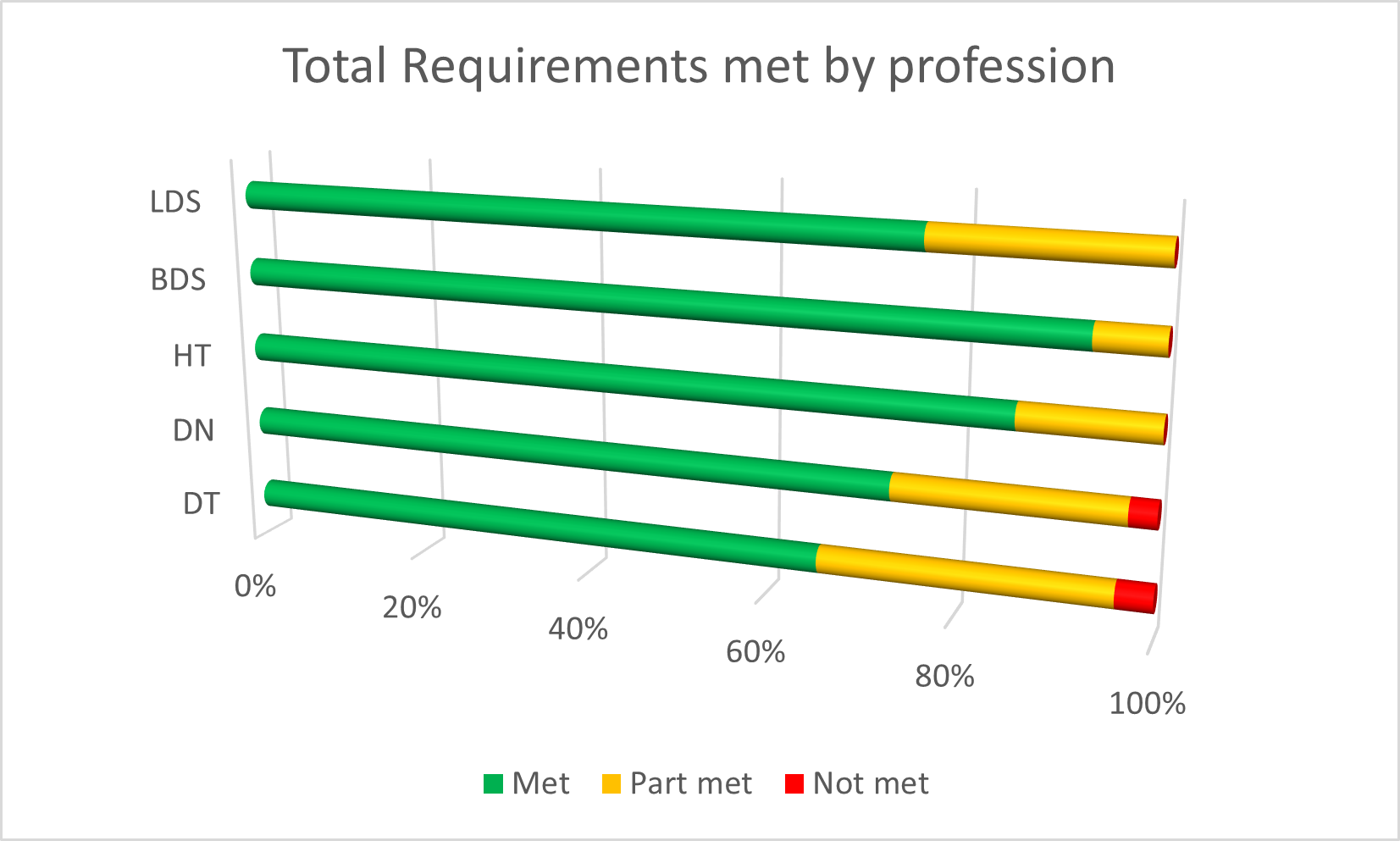
The data shows that we conducted significantly more inspections this academic year than in the previous year, when there were eight risk-based inspections across seven DCP programmes and one BDS programme. The data shows that there has not been any significant increase or decrease in the standards that are being met in most areas.
Whilst we did not have any significant concerns that relate to patient safety across all of our inspection work, we have identified that there are overall quality concerns that relate to the quality of assessment and the teaching of professionalism in programmes that are overseen by awarding organisations. We have seen an increase in risk-based inspection work specific to this provider type, mainly those awarding a diploma in dental nursing. Each awarding organisation that has been subject to inspection in this academic year will have individual actions that will be followed up in the usual way, with those actions being documented, followed up and published in the reports, but additionally the EQA team is undertaking a thematic review of dental nurse education and training in 2024.
The 'not met' requirements in relation to DT programmes were in relation to requirements 3 and 12. The two programmes were being delivered by one provider and the EQA lead is working with that provider to ensure that they meet set actions to improve.
Performance against Standard 1 – Protecting patients (requirements 1-8)
The chart below shows the percentage of Requirements 'met', 'partly met' and 'not met' across Standard 1:
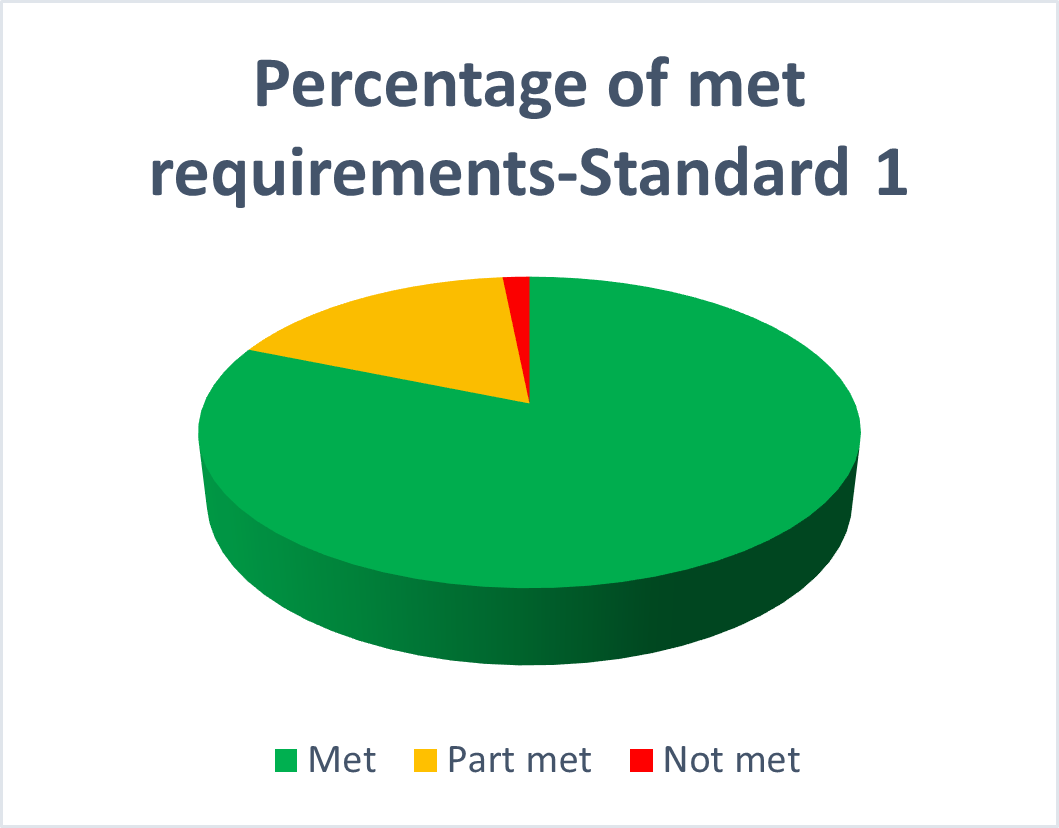
The chart below outlines a further breakdown per requirement for Standard 1 in the 2021-2022 academic year:
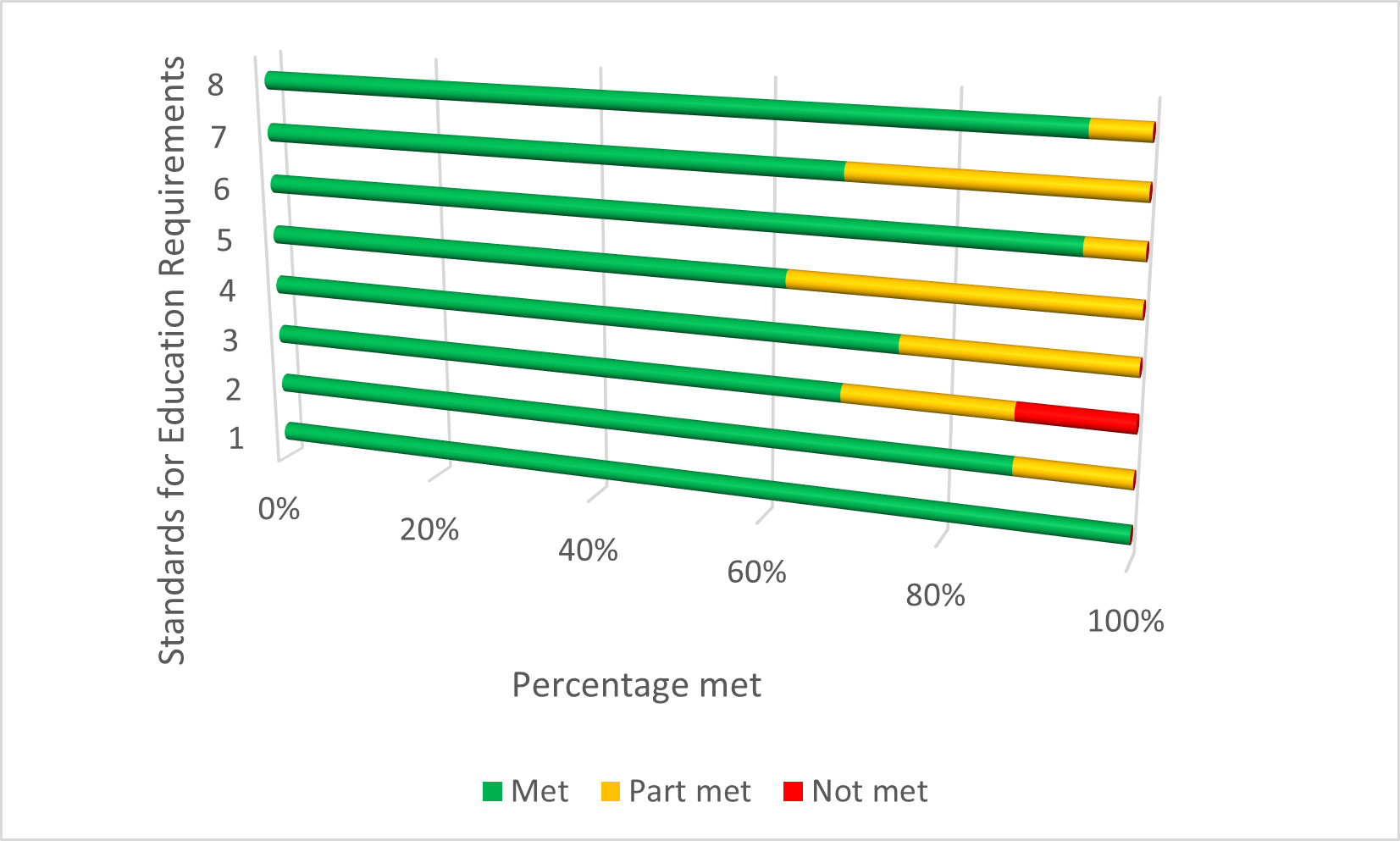
As in the previous year, Standard 1, which relates to protecting patients, has the most 'met' requirements across all of the Standards, closely followed by Standard 3. The 'partly met' requirements account for 14% of the requirements. Over half of the programmes inspected were dental nursing diploma programmes and dental technology (FdSc and BSc) with dental technology programmes having a higher proportion of 'part met' outcomes. We have identified several issues in dental technology and intend to carry out a thematic review of their training and education 2024-25.
Within Standard 1, some Requirements were ‘partly met’. The areas identified for improvement were as follows:
- Obtaining explicit patient consent consistently
- Ensuring work placements are meeting a minimum defined standard
- Demonstrating staff are regularly trained in areas such as EDI with records kept.
Examples of areas of good practice under Standard 1 included:
| University of Northampton, Foundation Degree Dental Nursing (FdSc) |
| Requirement 3: |
| The Faculty explained that the PebblePad portfolio for both years has been mapped to the two Dental Nursing module learning outcomes. This helps supervisors to determine the appropriate level of supervision required at each stage of a student’s development. |
| University of Central Lancashire, CDT programme |
| Requirement 2: |
| During the inspection, the panel was presented with a consent form which had been used for a student working within a CDT practice. The student was conducting a denture repair and had gained consent for this procedure. We were advised that students on the FdSc programme have more opportunities to engage with the consent form due to getting experience in a variety of environments. |
Performance against Standard 2 – Quality evaluation and review of the programme (requirements 9-12)
The chart below shows the percentage of Requirements 'met', 'partly met' and 'not met' across Standard 2:
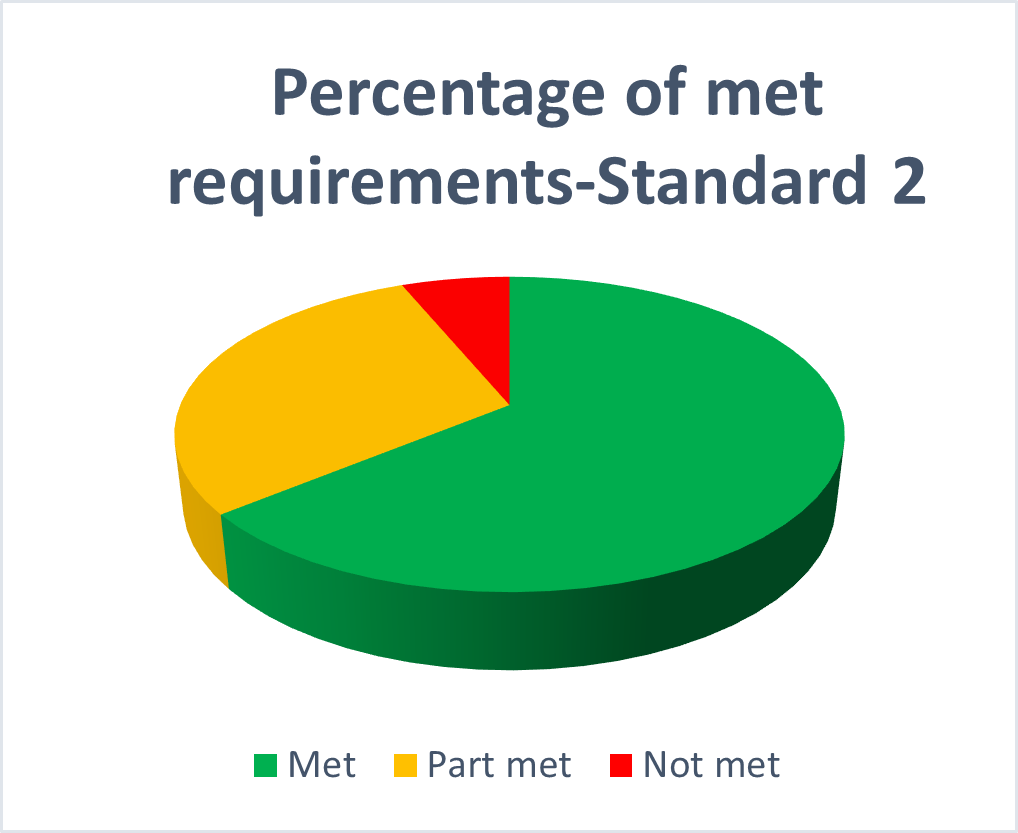
The chart below outlines a further breakdown per Requirement for Standard 2 in the 2022-23 academic year:
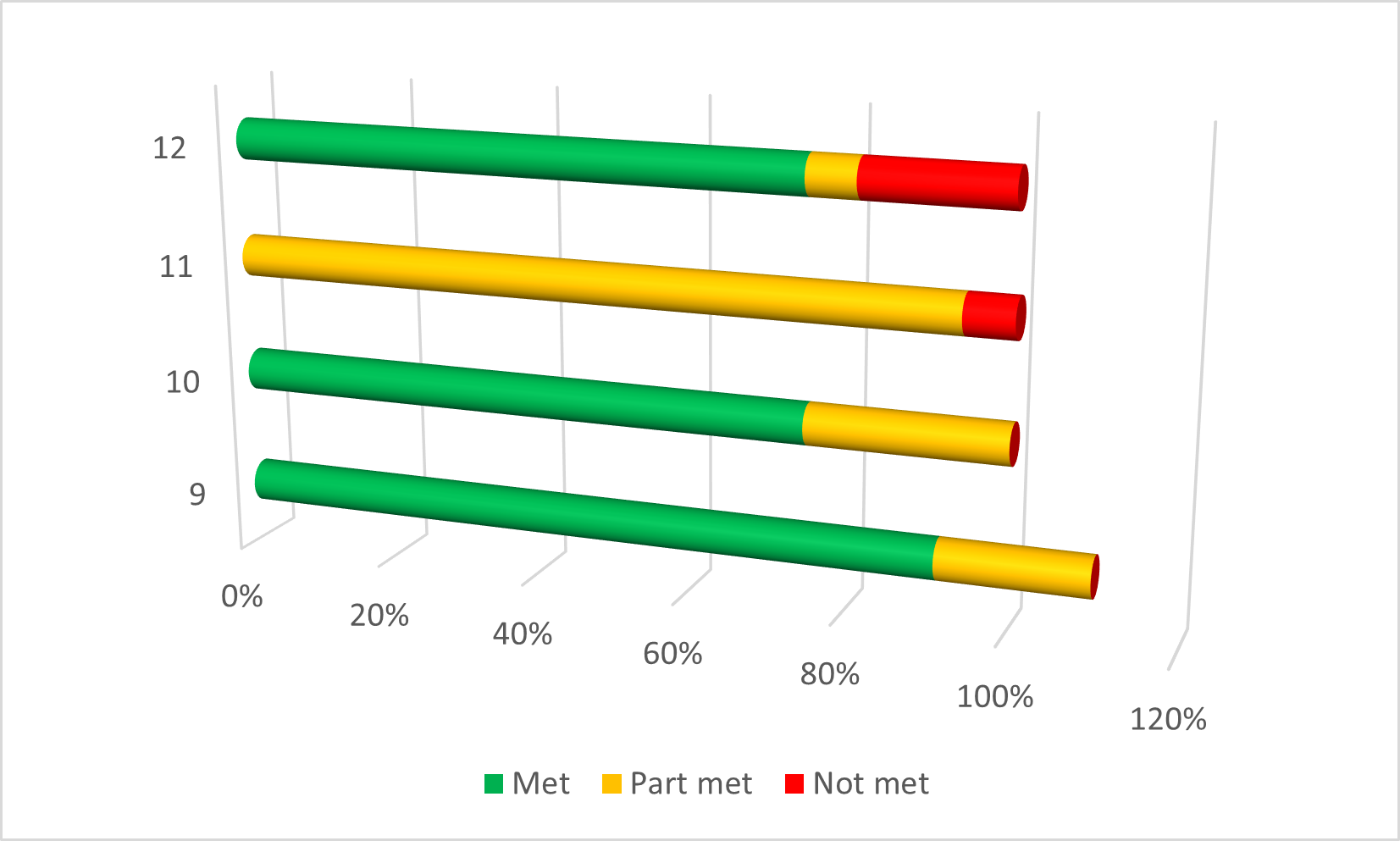
In comparison to the data in the 2021-2022 Review of Education this standard remains the weakest of the three in terms of providers being able to demonstrate that they have fully met the requirements. Requirement 11 specifically has been partly met by
only 12 of the 20 programmes. This requirement relates to internal and external quality assurance procedures, and the use of external examiners. The use of external examiners across dental nurse and dental technology programmes has been a particular
area of weakness, especially by those that are run by awarding organisations who have required additional support to comprehend what the GDC requires in terms of external oversight.
There has been a slight decrease in the number of programmes fully meeting the requirements under this standard, and an increase in requirements being ‘not met’. However, this must be balanced against the overall increase in inspection activity.
. The areas identified for improvement were as follows:
- Appropriate use of external examiners
- Quality Frameworks being applied consistently across programmes and can demonstrate that issues are addressed and monitored
- Formalising the collation and use of patient feedback.
Examples of areas of good practice under Standard 2 included:
| University of Dundee, Bachelor of Dental Surgery |
| Requirement 9: |
| The provider demonstrated a robust structure to collect feedback from across all stakeholders and students noted that they felt the school listened to their feedback |
| The Open University – Foundation Degree in Dental Technology |
| Requirement 11: |
The panel was given an overview of how the OU oversees and reviews work placement activity. During (re)validation events, the OU panel reviews the college specific placement QA process(es) and meets with students and workplace providers. If concerns are identified, the (re)validation panel has the authority to request additional placement visits are undertaken. In addition to this, the academic reviewer meets with students on an annual basis. If any concerns are identified through this channel, they are escalated to the OU validation programme team. The panel was satisfied that the mechanisms in place would provide an effective system to quality assure placements. |
Performance against Standard 3 – Student assessment (requirements 13-21)
The chart below shows the percentage of Requirements 'met', 'partly met' and 'not met' across Standard 3:
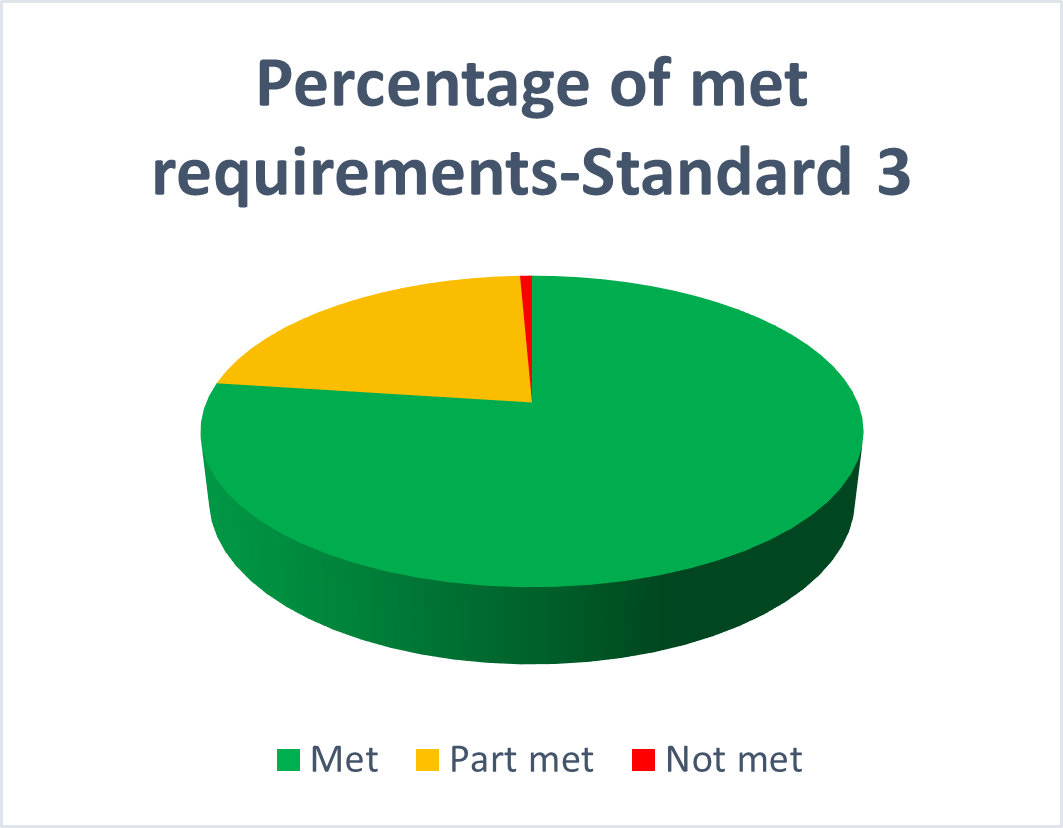
The chart below outlines a further breakdown per requirement for Standard 3 in the 2022-23 academic year:
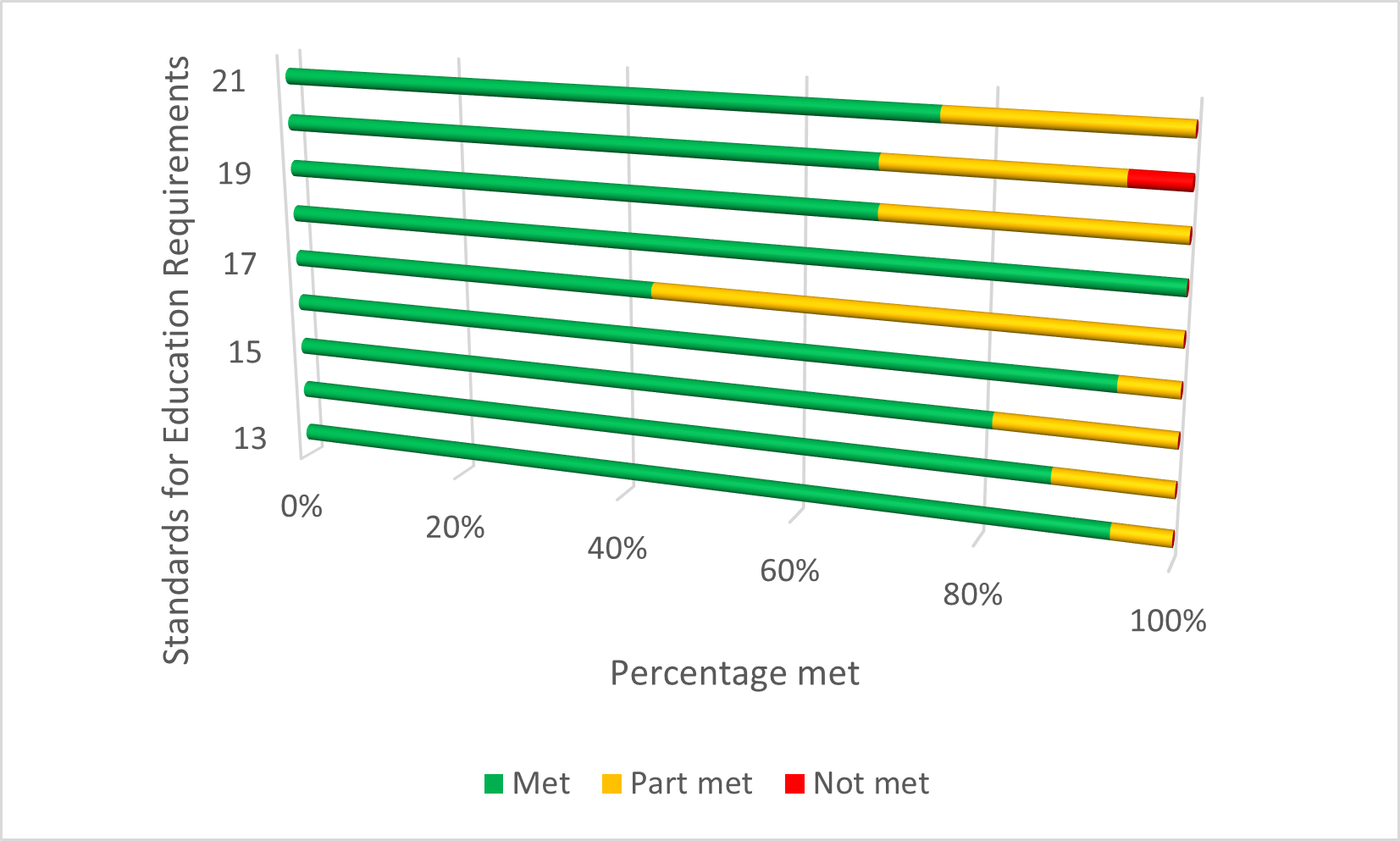
The level of requirements being met in Standard 3, relating to clinical experience and assessment, provided assurance that student experience was being suitably monitored, recorded, and assessed across the programmes inspected.
In comparison to the previous academic year, this Standard is well met by BDS, hygiene and hygiene therapy programmes, with the main programme types partly meeting the requirements being dental nursing and dental technology programmes.
Within Standard 3, some requirements were ‘partly met’ and there was just one programme who was not able to demonstrate that they had met requirement 20.
Requirement 17 was not fully met in over half of all programme inspections. Providers have struggled to meet this requirement. This requirement focusses on providers using feedback as an assessment method and this can often be challenging to suitably collect in the first instance. Additionally, feedback is subjective and therefore questionable in its reliability. It is reported that patient feedback is consistently positive which has the effect of making it ineffective in terms of assessment grading. This in turn, means that providers often struggle to demonstrate that this requirement is being met. The upcoming revision of the Standards for Education will provide a good opportunity to address this.
The areas identified for improvement were as follows:
- The enhancement of the use of patient feedback on all aspects of their training, such as professionalism.
- The standardisation of workplace placement assessors
- Ensuring that students are provided adequate and structured opportunity to use peer review as part of the assessment process.
Examples of areas of good practice under Standard 3 included:
| Cardiff Metropolitan University BSc Dental Technology |
| Requirement 20: |
| From our discussion with the students, the panel were satisfied that the students were aware of the standard expected of them. The school run numerous practical demonstrations before assessments, and these are recorded and uploaded online, so students can revisit them at any point. |
| University of Bolton, Bachelor of Science (Honours) in Dental Technology (BSc) |
| Requirement 18: |
| Students have the opportunity to reflect on their manufacturing practice in various course modules. Feedback is given to students on theory and practical projects, and this is continuous throughout the academic year. Students are regularly encouraged to consider academic and practical areas of development. |
Review of Education 2022-2023
-
Standards for Education
-
Reviewing new programme submissions Open Drop
-
Programme modifications Open Drop
-
Monitoring dental education programmes
-
Inspections
- Performance against individual standards and requirements Open Drop
- Performance against Standard 1 – Protecting patients (requirements 1-8) Open Drop
- Performance against Standard 2 – Quality evaluation and review of the programme (requirements 9-12) Open Drop
- Performance against Standard 3 – Student assessment (requirements 13-21) Open Drop
-
Quality assurance of specialty education Open Drop
-
Specialty curricula review Open Drop
-
Student and new registrant engagement work Open Drop
-
Learning outcomes review - safe practitioner Open Drop
-
Development plans for 2023-24 and beyond Open Drop
 eGDC
eGDC